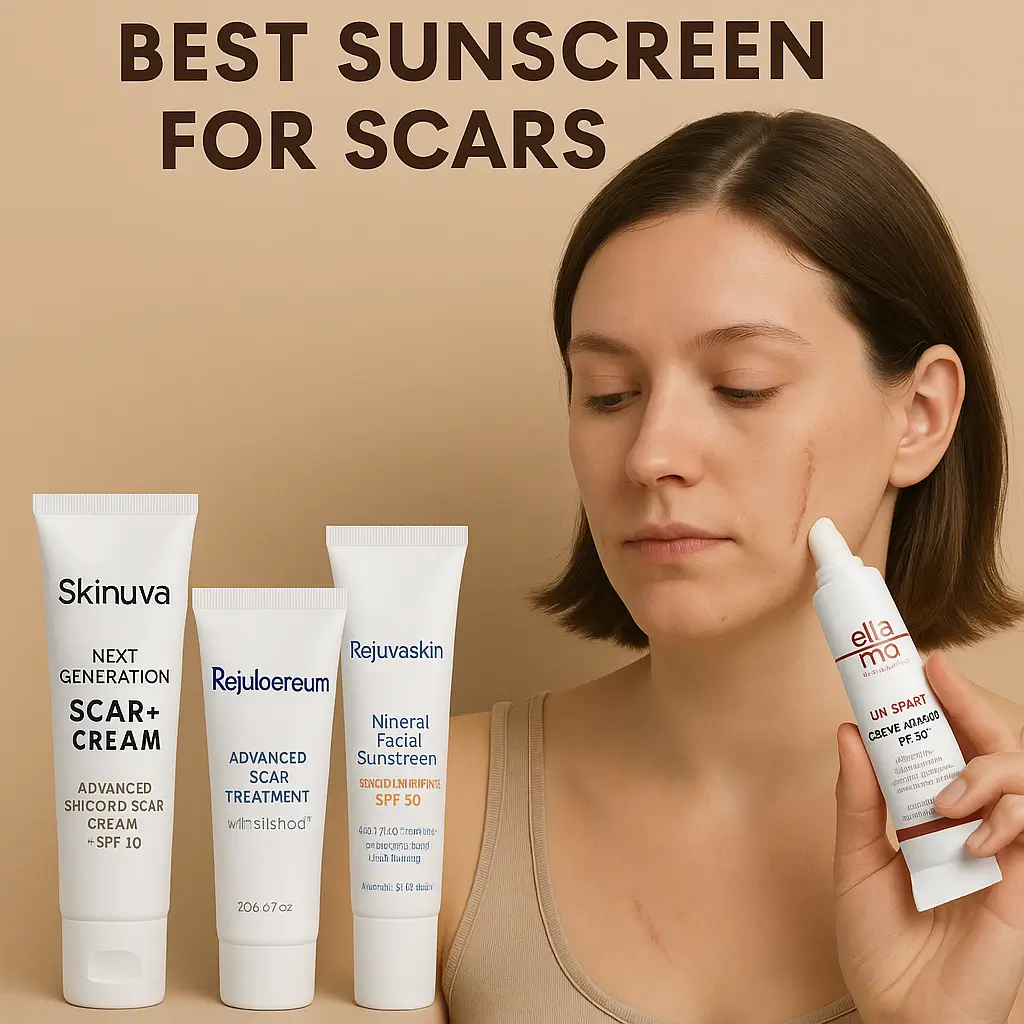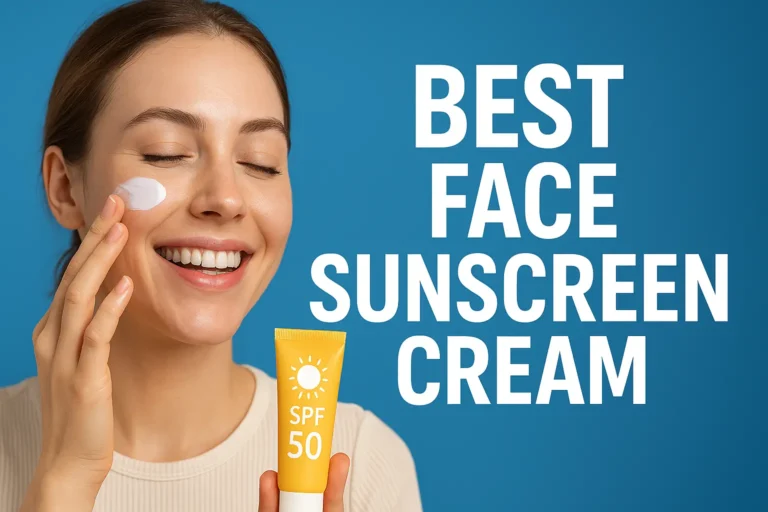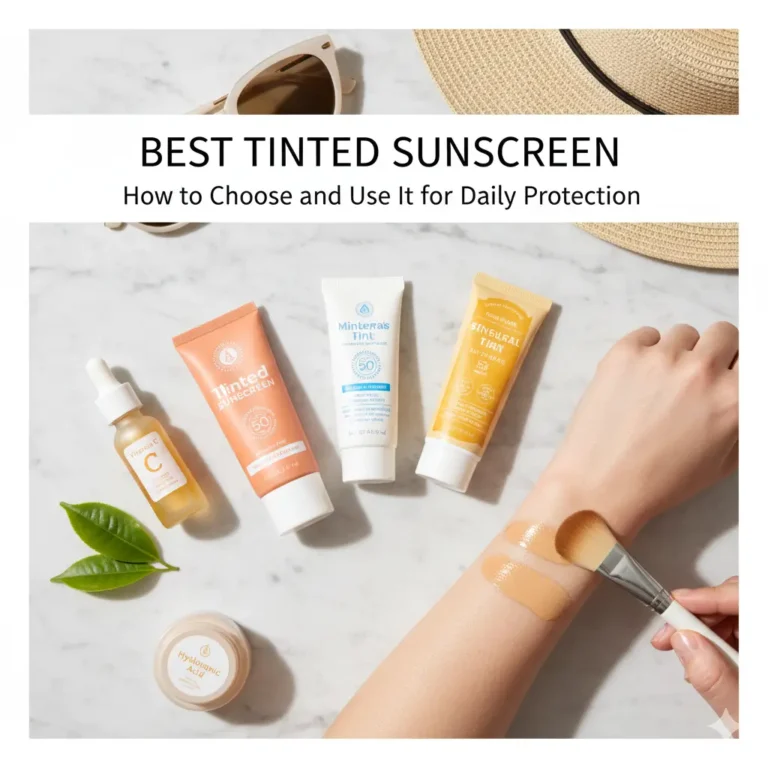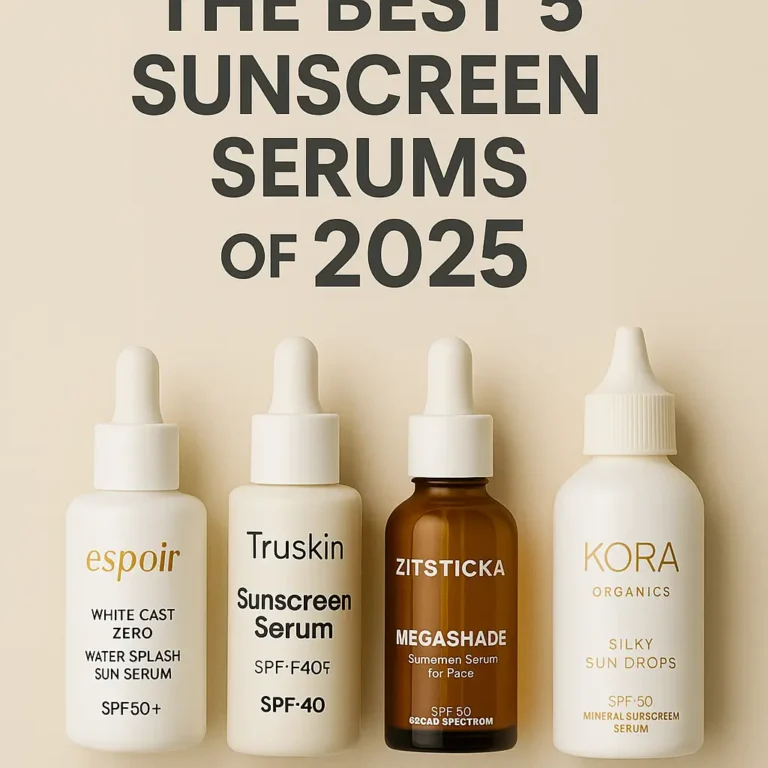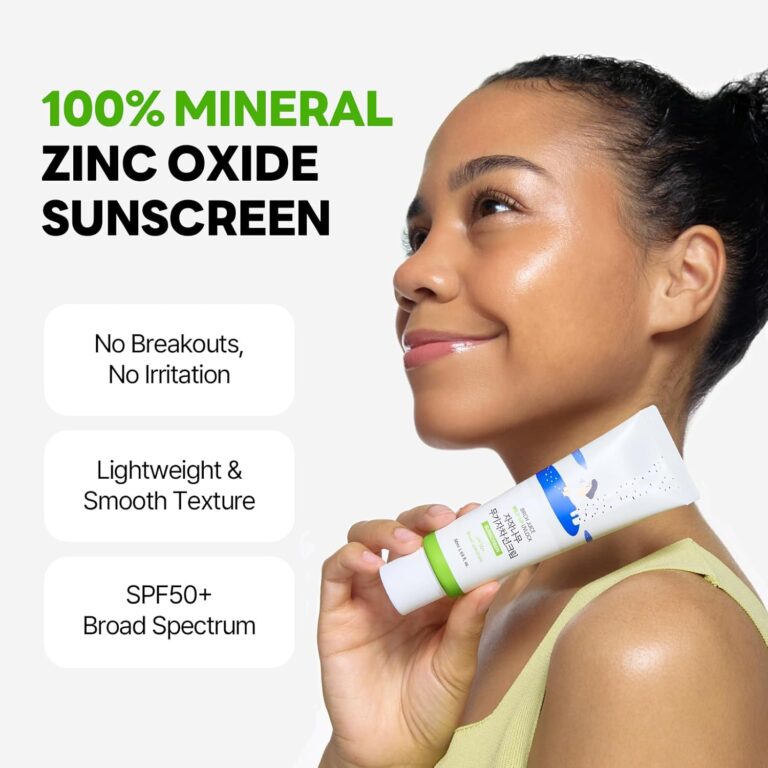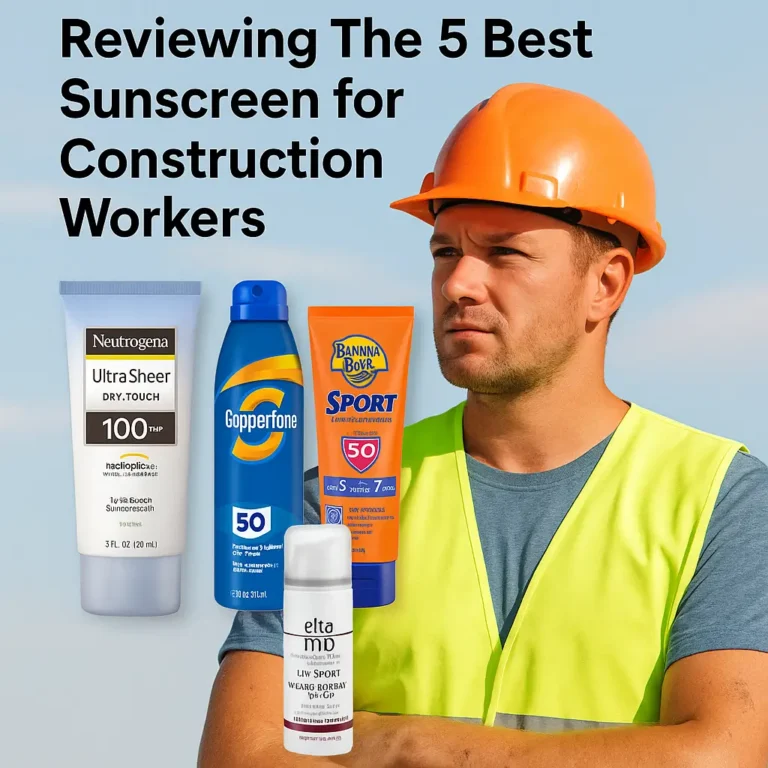The 5 Best Sunscreen for Scars in 2025: Reviews & Where to Buy
Table of Contents
If you’re dealing with scars—whether from acne, surgery, injuries, or other skin trauma—you’ve probably wondered about the best sunscreen for scars. Protecting scarred skin from UV damage isn’t just about preventing sunburn; it’s crucial for preventing darkening, promoting proper healing, and ensuring your scars fade as effectively as possible.
In this comprehensive guide, I’ll break down exactly why scar protection is different from regular sun care, review the top 5 best sunscreens for scars available today, and help you choose the perfect product for your specific scar type and skin needs. Whether you’re dealing with fresh surgical scars or old acne marks, the right sunscreen can make a dramatic difference in your skin’s healing journey.
Let’s dive into everything you need to know about protecting your scars while promoting optimal healing and fading.
Why Scars Need Special Sunscreen Protection
Before we explore the best sunscreen for scars, it’s essential to understand why scarred skin requires different care than healthy skin:
The Science Behind Scar Formation
Scars form when your skin produces collagen to repair damaged tissue. This new collagen has a different structure than your original skin, making it:
- More sensitive to UV radiation
- Prone to hyperpigmentation (darkening)
- Slower to heal when re-damaged
- More likely to become raised or discolored with sun exposure
Why Regular Sunscreen Isn’t Always Enough
Standard sunscreens protect against burning, but the best sunscreen for scars needs to go further by:
- Providing higher protection levels (SPF 30+ minimum)
- Including scar-healing ingredients like silicone
- Offering broad-spectrum protection against both UVA and UVB rays
- Being gentle enough for sensitive, healing skin
- Preventing post-inflammatory hyperpigmentation
The Cost of Inadequate Scar Protection
Without proper sun protection, scars can:
- Darken permanently (hyperpigmentation)
- Become more raised and noticeable
- Take significantly longer to fade
- Develop irregular coloration
- Require expensive treatments to correct
This is why finding the best sunscreen for scars is crucial for anyone serious about optimal healing and minimal long-term scarring.
What Makes the Best Sunscreen for Scars? Key Features to Look For
When searching for the best sunscreen for scars, certain features are non-negotiable:
Essential Protection Features
- SPF 30 or higher: Scarred skin needs maximum protection
- Broad-spectrum coverage: Protection against both UVA (aging/darkening) and UVB (burning) rays
- Water resistance: For active lifestyles and humid conditions
- Physical blockers preferred: Zinc oxide and titanium dioxide are gentler on healing skin
Scar-Specific Ingredients
- Silicone compounds: Help flatten and soften scars while providing a protective barrier
- Antioxidants: Vitamin C, vitamin E, and others support healing
- Anti-inflammatory ingredients: Reduce redness and irritation
- Moisturizing components: Keep scar tissue supple and promote healing
Gentle Formulation Requirements
- Fragrance-free: Reduces irritation risk on sensitive scar tissue
- Non-comedogenic: Won’t clog pores around acne scars
- Hypoallergenic: Minimizes reaction risk
- Dermatologist-tested: Ensures safety for compromised skin
The best sunscreen for scars combines all these elements into formulations specifically designed for healing and protecting damaged skin.
Top 5 Best Sunscreens for Scars: Comprehensive Reviews
After extensive research and analysis, here are the best sunscreens for scars currently available:
1. Skinuva® Next Generation Scar+ Cream – Advanced Silicone Scar Cream Matrix + SPF 30

Best Overall for Active Scar Treatment and Protection
Key Features:
- SPF 30 broad-spectrum protection
- Advanced silicone matrix technology
- Proprietary blend of healing peptides
- Clinically proven scar improvement
- Suitable for all scar types
What Makes It Special: Skinuva represents the gold standard in the best sunscreen for scars category because it’s specifically formulated as both a scar treatment and sun protectant. The advanced silicone matrix creates an optimal healing environment while the SPF 30 prevents further damage.
Pros:
- Dual-action formula treats existing scars while preventing new damage
- Clinically proven to improve scar appearance
- Suitable for face and body application
- Non-greasy, cosmetically elegant texture
- Developed by dermatologists specifically for scar care
Cons:
- Higher price point than standard sunscreens
- May take 8-12 weeks to see scar improvement results
- Limited availability in some regions
Best For: Fresh surgical scars, acne scars, and anyone wanting maximum scar improvement combined with sun protection.
Available at Amazon
2. Mederma Scar Cream Plus SPF 30

Best Budget-Friendly Option with Proven Results
Key Features:
- SPF 30 broad-spectrum protection
- Contains Cepalin® (onion extract) for scar healing
- Fragrance-free and hypoallergenic
- Non-comedogenic formula
- Widely available at drugstores
What Makes It Special: Mederma has long been trusted for scar treatment, and their SPF version makes it one of the most accessible options in the best sunscreen for scars category. The addition of SPF 30 to their proven scar formula creates an effective, affordable solution.
Pros:
- Excellent value for money
- Proven scar-healing ingredients
- Easy to find in most pharmacies
- Suitable for sensitive skin
- Can be used under makeup
Cons:
- Takes consistent use over months to see results
- Some users find the texture slightly sticky initially
- Not as advanced as prescription alternatives
Best For: Budget-conscious consumers, older scars, and those new to specialized scar care.
Price Range: $16 for 0.7oz tube
Available at Amazon
3. Biocorneum Advanced Scar Treatment with Silishield® & SPF 30

Best for Post-Surgical Scars
Key Features:
- SPF 30 mineral sunscreen protection
- Medical-grade silicone gel technology
- Self-drying, invisible finish
- Long-lasting protection (up to 12-24 hours)
- Recommended by plastic surgeons
What Makes It Special: Biocorneum is frequently recommended by plastic surgeons as the best sunscreen for scars following surgical procedures. Its medical-grade silicone technology combined with reliable sun protection makes it ideal for serious scar management.
Pros:
- Medical-grade formulation
- Excellent for fresh surgical incisions
- Long-wearing, doesn’t require frequent reapplication
- Invisible once dried
- Clinically proven effectiveness
Cons:
- Requires prescription or medical provider
- More expensive than over-the-counter options
- Can feel tight during initial application
Best For: Post-surgical patients, severe scarring, and those under dermatological care.
Price Range: $54 for 20g tube (prescription required)
Available at Amazon
4. Rejuvaskin Mineral Facial Sunscreen, Broad Spectrum SPF 32

Best for Acne Scars and Sensitive Skin
Key Features:
- SPF 32 mineral sunscreen with zinc oxide
- Specifically formulated for facial scarring
- Contains healing botanicals and antioxidants
- Non-comedogenic and oil-free
- Fragrance-free formulation
What Makes It Special: This product earns its place among the best sunscreen for scars by focusing specifically on facial acne scarring. The mineral-based formula is gentle enough for daily use while providing strong protection against hyperpigmentation.
Pros:
- Excellent for acne-prone skin
- Won’t clog pores or cause breakouts
- Lightweight, non-greasy texture
- Contains skin-soothing ingredients
- Good for daily use under makeup
Cons:
- May leave slight white cast on deeper skin tones
- Lower SPF than some alternatives
- Limited to facial use only
Best For: Acne scars, sensitive facial skin, and those prone to breakouts.
Price Range: $18-25 for 1.7oz tube
Available at Amazon
5. EltaMD UV Sport Broad-Spectrum SPF 50

Best High-SPF Option for Active Lifestyles
Key Features:
- SPF 50 broad-spectrum protection
- Water and sweat resistant for 80 minutes
- Zinc oxide and octinoxate protection
- Fragrance-free and paraben-free
- Suitable for face and body
What Makes It Special: While not specifically formulated for scars, EltaMD UV Sport makes the best sunscreen for scars list due to its exceptional protection level and gentle formulation. The high SPF and water resistance make it ideal for those with active lifestyles who need maximum scar protection.
Pros:
- Highest SPF level in our top 5
- Excellent for water sports and outdoor activities
- Trusted by dermatologists
- Suitable for all skin types
- Long-lasting protection
Cons:
- Doesn’t contain scar-specific healing ingredients
- Can feel heavy on facial application
- May require thorough removal at day’s end
Best For: Athletes, outdoor enthusiasts, and those needing maximum UV protection for their scars.
Price Range: $31 for 3oz tube
Available at Amazon
Best Sunscreen for Scars by Scar Type: Targeted Recommendations
Different types of scars have unique needs. Here’s how to choose the best sunscreen for scars based on your specific situation:
Fresh Surgical Scars (0-6 months old)
Best Choice: Biocorneum Advanced Scar Treatment
- Medical-grade silicone promotes optimal healing
- Long-lasting protection reduces reapplication needs
- Specifically designed for post-surgical care
Acne Scars
Best Choice: Rejuvaskin Mineral Facial Sunscreen
- Won’t clog pores or worsen acne
- Gentle mineral formula suitable for daily use
- Prevents post-inflammatory hyperpigmentation
Old/Mature Scars (1+ years old)
Best Choice: Mederma Scar Cream Plus SPF 30
- Proven ingredients for mature scar improvement
- Affordable for long-term daily use
- Good balance of treatment and protection
Keloid or Raised Scars
Best Choice: Skinuva Next Generation Scar+ Cream
- Advanced silicone matrix helps flatten raised tissue
- Clinical studies show improvement in scar height
- Dual-action treatment and protection
Large Body Scars
Best Choice: EltaMD UV Sport SPF 50
- High protection for large surface areas
- Water-resistant for active lifestyles
- Cost-effective for covering extensive scarring
How to Apply Sunscreen to Scars: Best Practices for Maximum Protection
Having the best sunscreen for scars means nothing if you don’t apply it correctly. Follow these expert tips:
Application Technique
- Clean the area gently with mild, fragrance-free cleanser
- Wait for complete drying before applying sunscreen
- Use generous amounts – don’t skimp on coverage
- Apply in gentle, circular motions – avoid aggressive rubbing
- Allow full absorption before applying makeup or clothing
Timing and Frequency
- Apply 15-30 minutes before sun exposure
- Reapply every 2 hours minimum
- Reapply immediately after swimming or sweating
- Use daily, even on cloudy days – UV rays penetrate clouds
Special Considerations for Scarred Skin
- Test new products on a small area first
- Be extra gentle with fresh or healing scars
- Avoid getting product in open wounds
- Consult your doctor if scars become irritated
Remember, consistency is key when using the best sunscreen for scars. Daily application, even when staying indoors near windows, helps prevent hyperpigmentation and supports optimal healing.
Ingredients to Avoid When Choosing Sunscreen for Scars
Not all sunscreen ingredients are suitable for scarred skin. When searching for the best sunscreen for scars, avoid these potentially problematic components:
Chemical Filters to Use Cautiously
- Oxybenzone: Can cause allergic reactions on sensitive scar tissue
- Octinoxate: May irritate healing skin
- Avobenzone: Can sting or burn on compromised skin barriers
Fragrances and Irritants
- Artificial fragrances: Unnecessary irritation risk for healing skin
- Alcohol-based formulas: Can dry out and irritate scar tissue
- Essential oils: May cause allergic reactions or photosensitivity
Physical Sunscreen Considerations
While generally gentler, some physical sunscreens can:
- Leave white residue that may make scars more noticeable
- Feel heavy or sticky on healing skin
- Require vigorous rubbing that could irritate scars
The best sunscreen for scars uses gentle, proven ingredients that protect without compromising the healing process.
Professional Recommendations: What Dermatologists Say About Sunscreen for Scars
Leading dermatologists consistently emphasize several key points when recommending the best sunscreen for scars:
Dr. Recommendations Typically Include:
- Minimum SPF 30 for any scarred skin
- Physical (mineral) sunscreens preferred for sensitive or healing tissue
- Daily use regardless of weather – UV damage occurs even on cloudy days
- Reapplication every 2 hours during sun exposure
- Year-round protection – scars need protection in all seasons
Clinical Evidence Supporting Scar Sun Protection:
Studies show that proper sun protection can:
- Reduce scar hyperpigmentation by up to 75%
- Improve overall scar appearance in 8-12 weeks
- Prevent keloid scar formation in susceptible individuals
- Speed healing time for fresh surgical incisions
When to Consult a Professional:
Consider seeing a dermatologist if:
- Your scars are worsening despite sun protection
- You develop new hyperpigmentation
- Scars become raised or more noticeable
- You experience persistent irritation from sunscreen products
Professional guidance can help you choose the best sunscreen for scars based on your specific skin type and scar characteristics.
Special Situations: Best Sunscreen for Scars in Unique Circumstances
Best Sunscreen for Scars During Pregnancy
Pregnancy requires extra consideration when choosing scar sunscreen:
- Mineral sunscreens preferred: Zinc oxide and titanium dioxide are safest
- Avoid chemical filters: Some may have hormonal effects
- Fragrance-free formulations: Reduce nausea risk from strong scents
- Recommended: Rejuvaskin Mineral Facial Sunscreen or EltaMD UV Physical
Best Sunscreen for Scars on Children
Children’s scarred skin needs special protection:
- Higher SPF requirements: Children’s skin is more vulnerable
- Gentle, tear-free formulas: Avoid eye irritation
- Water-resistant formulations: For active play
- Recommended: Biocorneum (with pediatric dermatologist approval) or gentle mineral options
Best Sunscreen for Scars During Cancer Treatment
Cancer patients with treatment-related scars need extra care:
- Consult oncology team first: Some treatments affect sun sensitivity
- Fragrance and alcohol-free: Minimize irritation on compromised skin
- Higher SPF essential: Treatment can increase photosensitivity
- Recommended: Medical-grade options like Skinuva or EltaMD UV Physical
Best Sunscreen for Scars in Extreme Climates
High altitude, tropical, or desert environments require special consideration:
- SPF 50+ mandatory: Higher UV exposure at altitude and tropics
- Water and sweat resistance: For humid or active conditions
- Reef-safe formulations: For marine environments
- Recommended: EltaMD UV Sport or other high-performance options
Common Mistakes When Using Sunscreen on Scars (And How to Avoid Them)
Even with the best sunscreen for scars, application mistakes can reduce effectiveness:
Mistake #1: Not Using Enough Product
The Problem: Most people use only 25% of the recommended amount The Solution: Use approximately 1/4 teaspoon for face and neck, 1 ounce for full body Scar-Specific Tip: Don’t skip coverage directly on scars – they need the most protection
Mistake #2: Inconsistent Application
The Problem: Skipping days or only using during obvious sun exposure The Solution: Make sunscreen part of your daily routine, regardless of weather Scar-Specific Tip: UV damage to scars occurs even through windows and on cloudy days
Mistake #3: Choosing the Wrong SPF
The Problem: Thinking SPF 15 is sufficient for scarred skin The Solution: Always use SPF 30+ on scars, SPF 50+ for extended outdoor exposure Scar-Specific Tip: Fresh scars may need the highest protection available
Mistake #4: Ignoring Reapplication
The Problem: Applying once and forgetting about it all day The Solution: Reapply every 2 hours, or immediately after swimming/sweating Scar-Specific Tip: Set phone reminders – consistent protection prevents hyperpigmentation
Mistake #5: Using Expired Products
The Problem: Old sunscreen loses effectiveness and may irritate skin The Solution: Replace sunscreen annually, sooner if it changes color, texture, or smell Scar-Specific Tip: Compromised sunscreen can make scars worse, not better
The Science Behind Scar Hyperpigmentation and Sun Protection
Understanding why scars darken in the sun helps explain why finding the best sunscreen for scars is crucial:
How UV Exposure Affects Scars
When UV rays hit scarred skin:
- Melanocytes become hyperactive: Scar tissue has disrupted melanin production
- Inflammation increases: UV exposure triggers inflammatory responses in healing tissue
- Collagen production changes: Sun damage can make scars thicker or more noticeable
- Healing slows down: UV damage diverts energy from repair to damage control
The Hyperpigmentation Cycle
Without proper protection:
- Initial darkening occurs within days of sun exposure
- Progressive deepening happens with repeated UV exposure
- Permanent discoloration can develop if protection isn’t consistent
- Treatment becomes more difficult once hyperpigmentation is established
Why Prevention is Better Than Treatment
The best sunscreen for scars is always more effective than:
- Hydroquinone treatments: Which can take months to show results
- Chemical peels: Which may worsen some scar types
- Laser treatments: Which are expensive and require multiple sessions
- Prescription medications: Which may have significant side effects
Consistent use of appropriate scar sunscreen prevents problems before they require costly, time-consuming treatments.
Frequently Asked Questions About the Best Sunscreen for Scars
Can I use regular sunscreen on scars?
While regular sunscreen provides some protection, the best sunscreen for scars offers additional benefits like scar-healing ingredients (silicone, antioxidants) and formulations designed for sensitive, healing skin. Regular sunscreen may not provide adequate protection against hyperpigmentation or support optimal healing.
How long should I use special sunscreen on scars?
For fresh scars, use specialized sunscreen for at least 12-18 months while the scar matures. For older scars, continued use of the best sunscreen for scars helps prevent further darkening and may gradually improve appearance. Many people benefit from permanent incorporation into their skincare routine.
Is SPF 30 enough for scars, or do I need higher?
SPF 30 is the minimum recommended for scarred skin, but SPF 50+ is often better, especially for:
- Fresh surgical scars
- Facial scars
- Scars in high-sun-exposure areas
- People with darker skin tones prone to hyperpigmentation The best sunscreen for scars provides adequate protection for your specific situation and environment.
Can sunscreen make scars worse?
The wrong sunscreen can potentially irritate healing skin, but this is rare with properly chosen products. The best sunscreen for scars is formulated to be gentle and non-irritating. The benefits of protection far outweigh the minimal risk of irritation, and unprotected scars almost always worsen with sun exposure.
Should I apply sunscreen to fresh surgical incisions?
Always follow your surgeon’s specific instructions. Generally, once the incision is closed and any dressings are removed (usually 1-2 weeks post-surgery), gentle application of the best sunscreen for scars is recommended. Some surgeons prefer specific medical-grade products like Biocorneum for post-surgical care.
Will using sunscreen on scars make them fade faster?
While sunscreen doesn’t actively fade existing scars, it prevents further darkening and supports optimal healing conditions. The best sunscreen for scars, especially those with scar-healing ingredients, can contribute to better overall scar appearance over time. Prevention of additional damage allows natural fading processes to work more effectively.
Key Takeaways
The best sunscreen for scars is one that:
- Provides adequate protection (SPF 30+ minimum)
- Contains scar-beneficial ingredients when possible
- Suits your skin type and sensitivity level
- Fits your budget for consistent daily use
- Addresses your specific scar type and age
Remember, consistency trumps perfection. The best sunscreen for scars is ultimately the one you’ll use every single day. Whether you choose a specialized scar treatment with SPF or a gentle mineral sunscreen, daily protection is your most powerful tool for preventing scar darkening and supporting optimal healing.
Don’t let your scars become a permanent reminder of past skin trauma. With the right protection and consistent use, you can help your scars heal better, fade faster, and remain as inconspicuous as possible. The investment in quality scar sunscreen today prevents costly treatments tomorrow and supports your skin’s natural healing journey.
Your scars don’t define you, but how you care for them shows your commitment to your skin’s health and your confidence in facing the world with your best skin forward.
Author’s Top Picks
- My honest Review of The Best Sunscreen for Golfers in 2025
- The 5 Best Sunscreen for Water Theme Parks Reviewed in 2025
- Reviewing The 5 Best Sunscreen for Construction Workers
- Review of The 5 Best Sunscreen for Redheads

